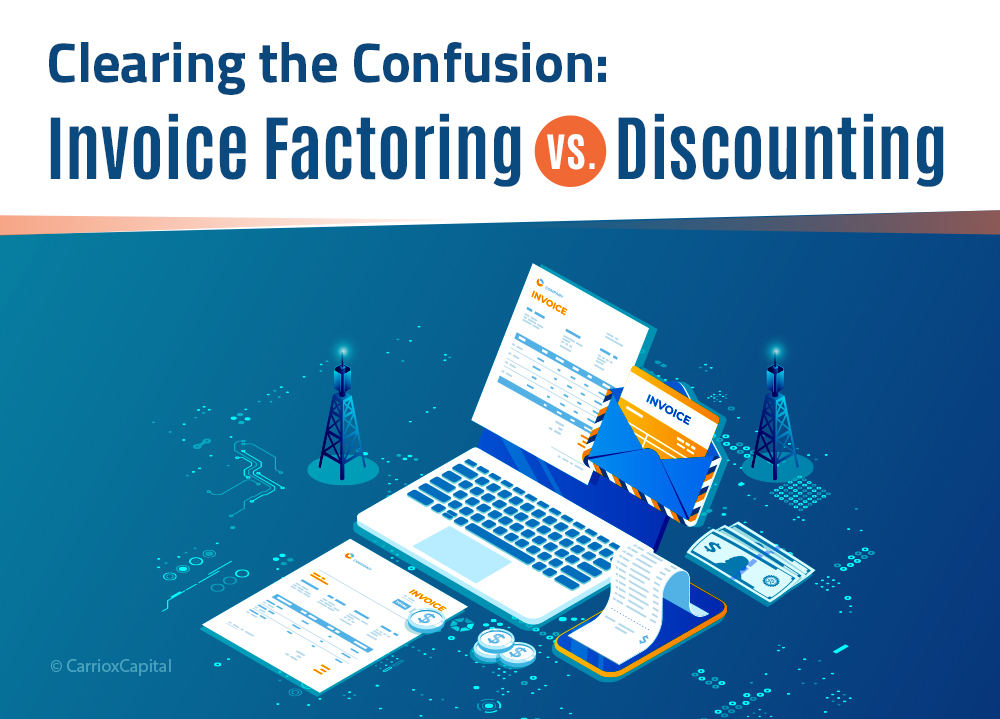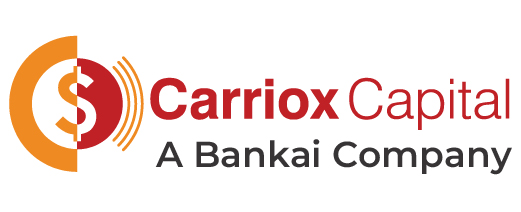Clearing the Confusion: Invoice Factoring vs. Discounting

The telecommunication industry encompasses service providers, operators, cell tower companies, carriers, and aggregators; the lengths of what it covers are endless. Capital and operational expenditure related to the information and communications technology (ICT) infrastructure and subscriber management may financially overwhelm telecom companies.
The research identified that the CAPEX planning of 64% of telecom operators was driven by equipment and technology requirements and not their business objectives. Such ineffective management of funding required for daily operations, maintenance, payroll, and other expenses, causes telecom businesses to lose on new opportunities and expansion projects.
Telecom invoice factoring is one of the many solutions that help keep pace with the company’s funding needs in a restrained cash flow. Accounts receivable financing for cell tower construction and other telecom businesses requires you to sell outstanding invoices from slow-paying clients to a third party to get an immediate cash injection. Invoice discounting is another financing facility that utilizes accounts receivable, but it’s not the same as invoice factoring.
Let’s understand the difference between the two and how to determine which financing option is better for your telecom company.
Similarities and Differences between Invoice Factoring and Invoice Discounting
Similarities
Financial Considerations
Neither requires company credit checks or provable assets. They are only concerned with the credit rating and reliability of your customers who owe the invoice.
Timeframe
Both release a certain percentage of the outstanding invoice within 24-48 hours. Similarly, it takes 30 to 60 days for customers to pay invoices.
Rewards Good Customer Relationships
Companies get better rates when customers pay invoices on time, rewarding the time spent to strengthen customer relationships.
Differences
Payment Collection
The invoice factoring company entirely takes over the collection of payments. In contrast, invoice discounting requires you to spend time and resources contacting your clients and collecting payment.
Visibility and Control
With telecom invoice factoring, the factoring company has exclusive rights over managing your credit control process, sales ledger, and outstanding invoices. The companies that owe you invoices will know that you are factoring due to cash flow problems. However, factoring allows you to do away with credit checking process.
With invoice discounting, you can manage your sales ledger and collect customer payments yourself. Whoever owes the invoice will have no idea you have gotten an advance on it through an invoice discounting agreement since you retain control of your customer relationships.
Adjustments to Advances
With telecom invoice factoring, any adjustments to the funds you receive are made daily.
Whereas invoice discounter doesn’t manage your sales ledger, you will have to provide a monthly reconciliation of the accounts receivable that reflects any changes in the level of debt to be disallowed. The discounter can then make adjustments to the funds that are available to you. In contrast to daily adjustments, monthly larger adjustments can be more difficult to deal with.
Cost
The telecom invoice factoring company will immediately pay you around 80-90% of the invoice amount. Once your clients pay the factoring company the full invoice amount, factor will pay you the remaining 10-20% minus the factoring fees, usually 1-5% of the total invoice value.
With invoice discounting, once you receive the payment from your customers, you repay the loan amount and the discounting fees, usually 1-3%. However, your business also incurs the cost associated with time and resources spent on collecting payments.
Risks
Invoice factoring is less risky as the factor manages credit control and collection processes. That’s why invoice factoring is a popular form of funding businesses that are hard up or threatened with bankruptcy.
Invoice discounting is riskier since the lender has no direct contact with the debtors. Therefore, discounters typically only lend to bigger companies with a turnover of over $100,000 and a positive net worth on their balance sheets. Some financing companies may focus on the quality of the debtor book and even larger turnover to reduce risks.
Which is the Best Financing Option for your Telecom Company?
While comparing the two, various factors must be considered before making the right choice of invoice financing for cell tower construction, subcontractors, carriers, or any other telecom business. Following is the list of factors based on which you can draw a comparison between invoice factoring and invoice discounting:
- Immediate financial requirement
- The scale of business operations
- Capacity to manage the sales ledger
- Ability to conduct credit control process
- Ability to optimize business resources
- Whether or not your business wants to retain rights over submitted invoices
The invoice factoring company will look after your sales ledger, credit control process, and payments, freeing time, resources, and hassle to focus on critical business operations. An excellent credit checking process leads you to customers that pay on time. Besides, it helps you negotiate better terms with your suppliers.
Invoice discounting can be an option if your company’s primary concern to avoid the wrong impression of having cash flow problems.
Unlock your Company’s True Potential by Releasing the Cash Flow
The Telecom industry is diverse and greatly impacts society and the economy as it provides the technological foundation for businesses to gain a competitive edge. Telecom companies often find their cash flow trapped because of the long payment terms, leading to inefficient capital management. It can negatively impact daily business operations, maintenance, the ability to purchase equipment, and business expansion opportunities. Cell tower construction companies, service providers, and other telecom operators can greatly benefit from telecom invoice factoring since it removes the cash flow vulnerability to late payments by saving you the hassle of the credit checking process and freeing up resources to fund crucial business activities.
Carriox provides accounts receivable financing for cell tower construction and commissioning companies, telecom operators, and subcontractors to help them bridge financial gaps in completing payment cycles.

Aditi Shembekar
Aditi is a Content Lead at Panamax, Inc. She believes that “Writing is an art, a passion, love.” Applying these thoughts in her writing, she always put her strong efforts while writing on any topic. She loves writing and technology is her favorite part. Meanwhile, in her "ME" time she loves watching movies and trying new recipes.

